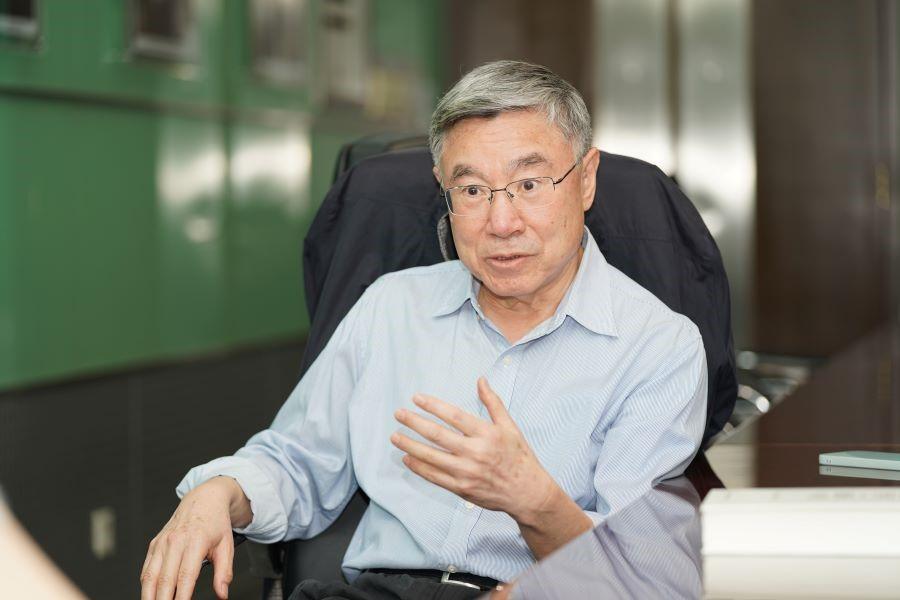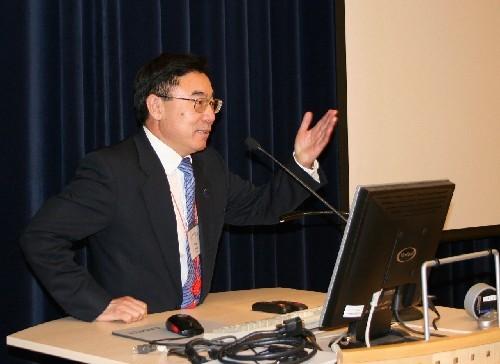
 0 Comment(s)
0 Comment(s) Print
Print E-mail China.org.cn, October 1, 2024
E-mail China.org.cn, October 1, 2024
Huang Youyi, former vice president of China International Communications Group (CICG), sits down for an interview on Sept. 26, 2024, in Beijing. [Photo/China.org.cn]
Veteran translator Huang Youyi has devoted most of his life to conveying China's voice through translation. Over the past five decades, he has worked on books such as "Mao Zedong Poems" and "Xi Jinping: The Governance of China," bringing some of China's most important official texts and cultural offerings to readers around the world.
From 1993 to 2013, Huang was vice president of China International Communications Group (CICG), once known as China International Publishing Group (CIPG), one of China's earliest and largest international communication organizations. Here, he was able to witness profound changes in the country's translation scene, as well as how the organization has transformed from focusing on translating words to interpreting language and culture.
Huang joined CICG right after graduating from Beijing Foreign Studies University in 1975. His first task was to help proofread an English edition of "Poems of Mao Zedong," matching the printed words to the poems being read aloud by veteran translators sitting at his side.
"It was truly a pleasure listening to those senior translators read the poems with passion," he said. "At the time, I thought this task was nothing special, but now when I looked back, it turned out to be an artistic and linguistic enjoyment, as well as a wonderful introduction to my translation career."
Huang soon began to undertake a variety of other tasks, which required knowing much more than just the words. "It could be an essay on industry in the morning, and another article on archaeology in the afternoon. And then the next day something on tourism," he recalled. "We have to get our feet wet before getting down to an assignment."
Huang's five-decade long career grew along with CICG and the Chinese translation community, which saw many significant transformations.
One major change was the birth of joint publishing. Chinese publishers had a much smaller distribution network overseas in the 1980s compared to today, and the international community had little access to works from China.
In 1987, Huang had the chance to visit the U.K., helping CICG to sign a deal with the prestigious Penguin Books to publish the English edition of the Chinese classic text, "Classic of Mountains and Seas."
A more significant venture came in the 1990s, when CICG organized a large cooperative publishing project with the U.S. Through this program, Chinese and American authors co-wrote the groundbreaking books series "The Culture & Civilization of China."
"It was a real in-depth cooperative effort, as it was not simply joint publishing, but involved authors from both countries who discussed the very details of the books, from assigning authors to how to write each chapter," Huang recalled.
A total of 10 books were later published, all of which made their way into major libraries and museums in the U.S. and other parts of the world in different language editions.
This China-U.S. cooperation project has been the largest in history and hailed as an unparalleled success, Huang said.
In addition to joint publishing, winning the bid to host the 18th International Federation of Translators (FIT) World Congress in Shanghai was a signature event in China's translation field. It was the first time the congress was held in Asia.

Huang Youyi, then vice president and secretary-general of the Translators Association of China (TAC), presents the application for hosting the 18th World Translation Conference on behalf of TAC in Tampere, Finland, on Aug. 3, 2005. [Photo/Guangming Daily]
In 2005, the Translators Association of China (TAC), with the support of CICG, bid to host the 18th FIT World Congress. Huang, then vice chairman and secretary-general of TAC, participated in the application process. Previously, the congress was typically held in European countries, according to Huang.
Through the 2008 congress in Shanghai, China increased its presence and expanded its network in the global translation field, meanwhile giving a huge boost to China's translation industry, Huang said. He himself was reelected FIT vice president, a first for TAC since it joined FIT in 1987.
In recent years, as China has strengthened its global influence, CICG's mission has increasingly focused on translating Chinese works for international audiences. "Indeed, I believe CICG's most important contribution to the translation field lies in its active participation in and promotion of translating China's stories to the world," Huang said.
Today, CICG publishes some 3,000 books and periodicals in over 40 languages each year. Its publications are distributed in more than 180 countries and regions. The group has received multiple domestic and international awards for its published books. The awards include the Chinese Government Award for Publishing, the highest award in the domestic news and publishing industry, as well as international awards including the Red Dot Design Award, Best Book Award of the Association of American University Presses, and the Hawkins Award of the Association of American Publishers.
As CICG strives for excellence in translation, moving on from simply books to increasingly multi-media works such as short videos and TV documentaries, Huang said he believes the most difficult — and rewarding — part is in cultivating more experienced translators. They need to have great proficiency in two languages, and have two ways of thinking, fully understanding the Chinese original and the reading habit of international audience, according to Huang.
And when it comes to that, China is still in urgent need of experienced translators, he noted. Despite being a major country on the global stage, the Chinese language is still less widely spoken and used by foreigners.
"Anyone eager to make China's voice heard should be well aware of his or her historic mission and continue to tell China's story to the world with their translation," Huang said.
Go to Forum >>0 Comment(s)